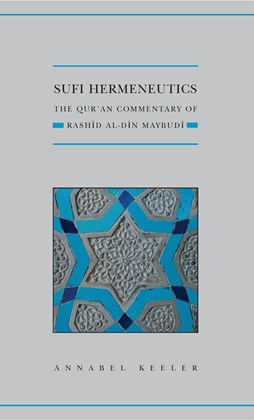Sufi Hermeneutics The Qur’an Commentary of Rashīd al-Dīn Maybudī
Oxford University Press in association with the Institute of Ismaili Studies
This book examines the Sufi approach to Qur’anic interpretation as exemplified in a twelfth-century Persian Qur’an commentary, Rashīd al-Dīn Maybudī’s Kashf al-asrār wa ʿuddat al-abrār (Unveiling of Mysteries and Provision of the Righteous). Written during one of the most exciting, formative periods in Sufism’s history, the commentary manifests the doctrines and the poetic language of love mysticism, which were to become essential elements of the later literature of Sufism. Dr Keeler analyses Maybudī’s approach to the Qur’an, examines the mystical doctrines of the Kashf al-asrār and shows how Maybudī conveys these teachings through his mystical interpretations of the stories of the prophets Abraham, Moses and Joseph.
Foreword, Gerhard Bowering
Note on transliteration
1. Introduction
Part I: Hermeneutics
2. The Hermeneutics of the Kashf al-asrār
3. The Hermeneutics of Mystical Commentary in the Kashf al-asrār
Part II: Mystical Doctrine
4. The Development of Love Mysticism in Khorasan
5. God and the Creation
6. Aspects of Spiritual Guidance
7. Mystical Theology and the Way of Love
Part III: Maybudī’s Mystical Interpretation of the Stories of the Prophets
Prolegomenon: Prophets in the Qur’an and in Sufi Exegesis
8. The Story of Abraham
9. The Story of Moses
10. The Story of Joseph
Conclusion
Bibliography
Index of Qur’anic Citations
Index
‘Sufi Hermeneutics is an impressive achievement. Annabel Keeler’s study of Maybudī’s mystical interpretation of the Qur’an, one of the classics of Sufism, reveals the multileveled world of Sufi engagement with the Sacred Text, as well as its exposition and commentary in Persian. Clearly written and solidly researched, this is an essential resource for the study of the Qur’an, Sufism, and the history of Islamic thought.’
– Carl W. Ernst, William R. Kenan Jr. Distinguished Professor of Religious Studies, University of North Carolina
‘Dr Keeler has performed a major service to Islamic Studies by bringing to light what is arguably one of the most important Qur’an commentaries in the Persian language. Here are prefigured all the major themes celebrated by the Sufi poets, such as ʿAṭṭār, Rūmī and Ḥāfiẓ. The commentary summarises the transmitted interpretations in detail, and then explains the inner meanings of selected verses in remarkably beautiful language. This is a book for everyone interested in the history of Qur’an interpretation, Sufism and Persian literature.’
– William C. Chittick, Professor, Department of Asian and Asian-American Studies, Stony Brook University
Annabel Keeler is an Affiliated Researcher at the Faculty of Asian and Middle Eastern Studies and a Research Associate of Wolfson College, both at the University of Cambridge. Her research interests include Sufi exegesis, early to ‘classical’ Islamic mysticism, Persian literature and prophetology. As well as being the author of Sufi Hermeneutics: The Qur’an Commentary of Rashīd al-Dīn Maybudī (Oxford, 2006), she is co-translator of the commentary of Sahl al-Tustarī, under the title Tafsīr al-Tustārī (Kentucky, 2011) and co-editor of The Spirit and the Letter: Approaches to the Esoteric Interpretation of the Qur’an (Oxford, 2016).

